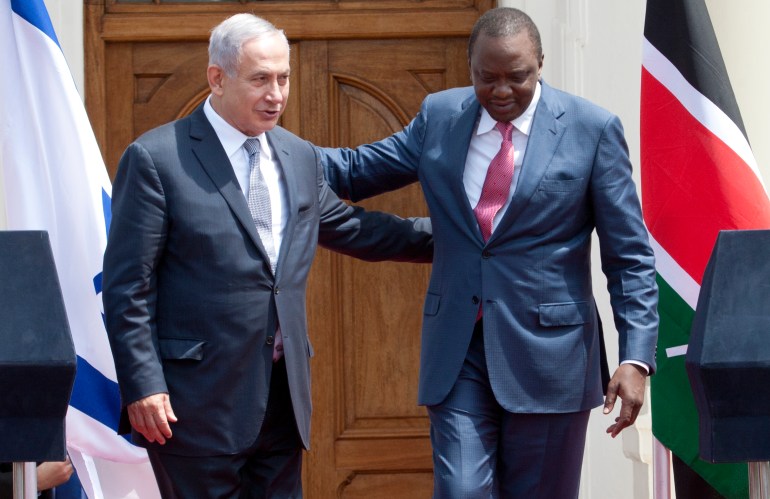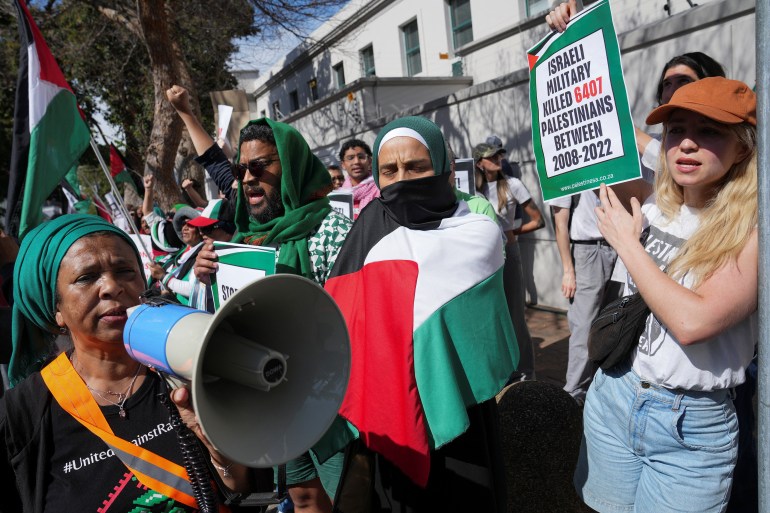As experiences of Hamas fighters attacking southern Israel final Saturday flooded telephones and tv units world wide, Kenyan President William Ruto took to X, the social media platform previously referred to as Twitter.
“Kenya joins the remainder of the world in solidarity with the State of Israel and unequivocally condemns terrorism and assaults on harmless civilians within the nation,” he wrote. “There exists no justification in any way for terrorism, which constitutes a severe risk to worldwide peace and safety.”
“The worldwide neighborhood should mobilise to carry the perpetrators, organisers, financiers, sponsors, supporters and enablers of those reprehensible legal acts of terrorism to account and speedily carry them to justice.”
It was an specific endorsement of Israel’s place and – some would argue – the response that Prime Minister Benjamin Netanyahu’s authorities has since unleashed on the Gaza Strip, with a bombing marketing campaign that has killed more than 1,900 people. And it was a social media put up that underscored Israel’s rising affect in Africa.
Because the loss of life toll from the struggle mounts, African governments are wading into heated debates surrounding the battle – with the continent break up, as totally different nations take opposing sides.
Authorities in South Africa blamed the escalation on Israel’s unlawful occupation and desecration of the Al-Aqsa Mosque, in addition to sacred Christian websites, in an announcement on Sunday. A high official, Zane Dangor, instructed native information channel eNCA that Hamas’s bloody assault, whereas not an answer, was unsurprising and that the battle wouldn’t cease “till the occupation ends”.
Algeria declared “full solidarity with Palestine” early on within the struggle. The African Union Fee beneath Moussa Mahamat Faki, whereas expressing concern over the violence, has blamed the “denial of the elemental rights of the Palestinians” and referred to as for a two-state resolution.
However Kenya, Zambia, Ghana and the Democratic Republic of the Congo are amongst different African nations which have aligned with Israel’s place.
So why is a continent that suffered the worst ravages of colonialism and racism for hundreds of years and that has traditionally, for probably the most half, supported Palestine, break up now?
The brief reply: Africa’s divisions spotlight every authorities’s try to compartmentalise their pursuits, specialists say, and underline some nations’ strengthening ties with Israel. On the one hand, there are deep-rooted ties with the Palestinian motion; on the opposite, the provide of cutting-edge expertise, navy help and support from Israel. Which wins out might decide how Africa tilts if this battle drags on – and sooner or later.
A ‘historic and emotional’ relationship
African nations shedding the ache of brutal colonial rule within the Nineteen Sixties had been chilly to a newly shaped Israel and had been sympathetic to the battle of Palestinians uprooted from their land and houses in 1948.
Following the October War of 1973, the continental bloc, then the Organisation of African Unity (OAU) severed ties with Israel.
Algeria has been a number one critic of Israel on the continent – at the same time as its rival Morocco’s relations with Israel have blossomed after they agreed to normalise ties in 2020.
Zine Labidine Ghebouli, a researcher with the European Council on Overseas Relations (ECFR) traces a few of Algeria’s sentiments to the 1988 Palestinian Declaration of Independence in Algiers and even additional again to Algeria’s historical past beneath French colonialism.
“The Algeria-Palestine relationship could be very historic and emotional,” Ghebouli instructed Al Jazeera, including that Islam as a typical faith solidifies these ties. “We had been occupied by France, and this historical past of brutality is analogous.
“On my social media feed proper now it’s all about solidarity with Palestine for the time being.”
However post-apartheid South Africa has maybe been Palestine’s most staunch supporter on the continent, with Nelson Mandela famously drawing parallels between the battle of Black South Africans in opposition to white rule and of Palestinians in opposition to Israel’s occupation. Many human rights teams have subsequently additionally made that comparability.
In July 2022, South African Overseas Minister Naledi Pandor called on the United Nations to declare Israel an “apartheid state”. Amid Russia’s struggle on Ukraine, as Western stress grew on South Africa and different nations in Africa and Asia to sentence Moscow’s actions, Pandor pushed back, asking why Western capitals weren’t keen to use the identical rules of worldwide legislation when it got here to Israel’s occupation of Palestinian lands.
Nonetheless, that vocal diplomatic help for Palestine masks a extra complicated relationship between African nations and Israel – one which has quickly grown in recent times, reshaping the continent’s strategy to the Center East.

After the 1973 struggle, solely a handful of African nations retained relations with Israel, whereas most broke ties. But, immediately, that tide has turned dramatically: 44 of 54 African nations recognise Israel’s statehood, and near 30 have opened embassies or consulates in Tel Aviv.
Israel’s extensively recognised prowess in agriculture has helped its trigger – at a time when many African nations battle drought, floods and excessive climate phenomena at growing frequencies. A fifth of Africa’s inhabitants is undernourished.
“Israel’s function as one of many world’s leaders in agricultural applied sciences is a really engaging incentive for African nations battling insecurity and for economies with arid and semi-arid lands,” Tighisti Amare, deputy director of the Africa Programme on the London-based Chatham Home assume tank mentioned.
“As such, many African nations have chosen to train their company and separate financial pursuits from political positions in worldwide fora,” she added.
Nevertheless it’s not simply agriculture. Commerce and safety pursuits too have made many African nations heat as much as Israel, mentioned Alhadji Bouba Nouhou, a lecturer on the College of Bordeaux.
A key turning level got here in 1978, with the Camp David Accords between Egypt and Israel.
“Issues actually began to vary following the Camp David agreements,” Nouhou instructed Al Jazeera. With a significant Arab nation signing a peace cope with Israel, many African nations determined it made little sense for them to remain away.
That development gained extra momentum after the Oslo Accords of 1993 – a interval that additionally marked the demise of the apartheid regime in South Africa, the top of the Chilly Struggle, and the promise of rapprochement between Israel and African nations. Extra just lately, the normalisation offers struck with Chad, Morocco and Sudan signify main wins on the continent for Israel.
South Africa, considered one of Israel’s fiercest critics on the continent, can also be its greatest buying and selling accomplice in Africa – by far.
In 2021, commerce between Israel and Sub-Saharan African nations reached over $750m. Israel exports equipment, electronics, and chemical substances to the continent. Of that, practically two-thirds had been traded with South Africa, adopted by Nigeria, with which Israel traded items price $129m in 2021. South Africa additionally trades with Palestine, with Palestinian exports of olive oils and different edibles leaping 34 p.c between 2009 and 2021.
But, Israel additionally has robust ties with nations past commerce.
For many years, it has pumped thousands and thousands of {dollars} in humanitarian support into Ethiopia. 1000’s of Ethiopian Jews have made their approach to Israel.
Mashav, Israel’s worldwide support company, has additionally flown in Kenyan college students for coaching in agriculture and medication and skilled Senegalese entrepreneurs in administration.
In the meantime, in Cameroon, Israeli forces are believed to be propping up longtime ruler Paul Biya by coaching the BIR, an elite fearsome military unit that solutions on to the president. Israeli media experiences have recommended that the nation can also be coaching troopers in a number of African nations.
An Africa-Israel summit was scheduled to be held in 2017, though a disaster within the host nation Togo led to it being referred to as off. However earlier that yr, Netanyahu, chatting with West African leaders at a gathering in Liberia, declared: “Israel is coming again to Africa, and Africa is coming again to Israel.”
Regardless of all of those good points, nevertheless, Israel has additionally continued to face setbacks in Africa.
Earlier inroads bolstered Aleligne Admasu, Israel’s ambassador to the African Union, to hunt Observer Standing for Israel within the bloc in 2021. Though the request was granted, Israel’s standing was suspended this February, after Algeria and South Africa protested the transfer. Palestine, then again, has retained AU Observer Standing since 2013.

Two-faced governments?
So are African governments two-faced concerning the Israel-Palestine battle – buying and selling with Israel and strengthening ties with it, whereas additionally, in some circumstances at the least, talking up for Palestine?
Consultants say that neither their seeming contradiction nor the divisions inside Africa on the difficulty are stunning – and level to the current break up in positions after Russia invaded Ukraine in February 2022.
“When the struggle broke, whereas Russia’s invasion of a sovereign nation was not condoned, a 3rd of African nations selected to stay impartial within the UN vote condemning Russia’s invasion,” Amare of Chatham Home reminded.
“It isn’t uncommon for this to occur and expectations that African nations could have the identical response to a disaster is mostly misguided,” she mentioned.
In one other instance, African nations, regardless of intensifying relations with Israel, voted overwhelmingly in opposition to the US resolution to open an embassy in disputed Jerusalem in a UN emergency assembly again in 2017.
And politics would possibly quickly seep into commerce relations. Whereas South Africa is the pillar of Israel’s commerce with the continent, there may be rising stress from civil society for Pretoria to take a clearer place in favour of Palestine, Muhammed Desai, director of the South African advocacy group Africa4Palestine, instructed Al Jazeera.
“Final yr, South Africa’s parliament handed a decision to downgrade South Africa’s diplomatic relations and embassy in Israel,” Desai mentioned.
“As we converse, South Africa doesn’t have an envoy in Israel,” he identified. “As civil society, we’re advocating for our authorities to do extra: All relations and commerce with Israel ought to be boycotted, each at a public stage but additionally by the non-public sector.”
If Israel’s lethal bombardment of Gaza continues and is adopted by a land invasion, count on such calls to develop.
